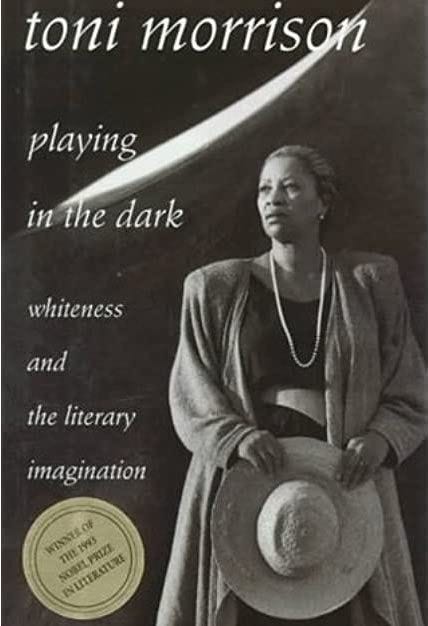Toni Morrison is a philosopher.
The omission of Blackness speaks just as loudly as a concentration on whiteness. So says Toni Morrison in her book, “Playing in the Dark: Whiteness and the Literary Imagination.”
I read this book a while ago and I don’t remember what inspired me to purchase it. What I do know is, that after reading it, I see the absence of Blackness in white spaces as loud and glaring.
I say that Toni Morrison is a philosopher1 because she opens up this book in conversation with Valentine Mudimbe, a Congolese philosopher who coined the idea of “Africanism,” to name the ways that “Africa” is an invention of the West. There is no sense of “Europeanness” without the colonizing gaze upon Africa that formed and shaped distinctions rooted in racism. These inventions include the idea that “Africa” is backward and traditional and Europe is forward-thinking and advanced.2 If you did not know, these ideas and observations can be found all over early anthropologists’ writings. Morrison points out how this parallels the formation of whiteness and blackness as opposites based on similar ideologies. The point she is making is that even in stories written where Black people are absent and whiteness is overt and glaring, there are values and morals present.
She describes what she calls “African Americanism” and its presence in American literature:
“It is an investigation into the ways in which a nonwhite Africanlike (or Africanist) presence or persona was constructed in the United States, and the imaginative uses this fabricated presence served.[…] through the simple expedient of demonizing and reifying the range of color on a pallet, African-Americanism makes it possible to say, and not say, to inscribe and erase, to escape and engage, to act out and act on, or size and render timeless.”3
For a book that is less than a hundred pages, I have returned to it time and time again stretching my head, but I come away with a stronger conviction that our metaphors are not innocent.
They followed the star
We must examine the stories underneath the stories.
I chose the title for this series while reflecting on a story from Advent that has met so much to me in this season. So much has happened that has contributed to my sense of being jaded by the Church and Christian community. I have not called a church “home” in over a year. 2020 and 2021 pushed me over the edge of myself in more ways than I dare to say, and in the midst of what seemed like a piercing darkness, I found a way of knowing.
Like the Magi, who followed the star to find the infant Jesus.
I have never written an Advent series before, so forgive me if I do not follow the themes you are used to. I may not offer you comforting thoughts to rest in. But for today, I offer this poem I wrote while I was honoring the revelations of the dark. I wrote “For the ‘Newly Tired’” while I was trying to figure out what racial fatigue had to teach me and others.
For the “Newly Tired”
a poem by me, written in the summer of 2020
I’m glad you hear the sound of the sirens
That have been going all night long
They have been keeping me awake for years
I’m glad you are finally asking yourself
And everyone else
Why we have let them ring for so long
They’ve been ringing since before I was born
I’m glad you are now in the same insomnia as me,
Even if a little differently.
Often, I have watched you nod off,
Until the next alarm forces you awake
I have often thought it tender that you can even sneak in a nap in between them
Sometimes I have been able to pretend I am sleeping
Sometimes I’ve been able to make daydreams feel like rest
We may be wide awake together
But we are not the same.
You haven’t started seeing things in the dark yet
Shadows you are trying to make sense of
Movements you are trying to understand—
The night has yet to become a language to you
You still need me to tell you what I see, since your eyes are still adjusting—
Perhaps one day, morning will come and we will no longer have to squint with tired eyes
Perhaps morning will come,
and it will feel good to rest
Even as the day moves on
And so do you
Or maybe
We may never sleep again—
For now, I name the shadows,
Like an Adam made in the night
I’ve been naming these shadows for years,
I’d be happy to introduce you
But as I do, I must confess,
I have given you a name as well
In this long night, you have been called
Newly Tired,
It is not the best way to live
I hope, it is not the only way to live
But so long as we live to long for Day
At least here I am your seniorLonging for Jesus
I am growing a love for learning about space and the stars. Living in the city makes it hard to see stars because of light pollution. The wonders of the night sky reveal to us the deep and mysterious expanse universe.4 I find that I am longing for Jesus, waiting for Jesus to appear through the thick clouds of academic knowledge...through the smoke and mirrors of immature faith...through the misty eyes of church hurt.
Growing up, I thought the story of the Magi, or the three Wise men, was so random. But now I see how deeply beautiful it is to see how people so far away could be drawn toward Jesus—and could do so while resisting the orders of someone who intends to bring harm to him.
They were able to discern that there was something different about this child born in the thick of the night. They discerned that that difference was not only beautiful but honorable and worth protecting.
While Morrison pointed out the harms of the white imagination in literature, let us not ignore its harms in our liturgies. Let us celebrate the one who comes “in Blackness, like a star.”
A lot of Black women are philosophers, in my opinion. I think of Lucille Clifton as one. Philosophy as an academic subject is so gatekept. But if it were more expansive, we might find there are philosophically minded people of various skin tones left out of the discourse. But, I digress.
Morrison, Playing in the Dark, 6-7. For more on V. Mudimbe’s philosophies, read The Idea of Africa and The Invention of Africa.
Morrison, Playing in the Dark, 7.
With good reason, because while I am here for reclaiming metaphors, I recognize that well-lit streets at night have a lot to do with safety. Especially for the vulnerable.




